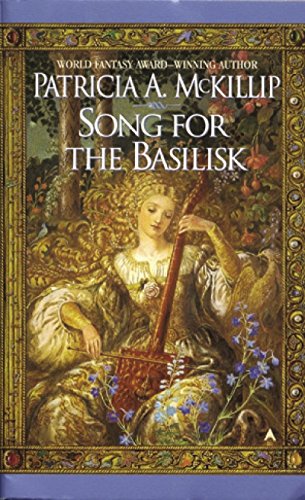
![]() Song for the Basilisk by Patricia McKillip
Song for the Basilisk by Patricia McKillip
One of Patricia McKillip’s earlier novels, Song for the Basilisk has all the hallmarks of her fantasy fiction: unique prose, ambiguous characters, fairytale settings, court intrigue, and a love of musical instruments. Here especially McKillip calls on her appreciation for viols, flutes, harps and picochets (the one-stringed instrument on the cover), in which music plays a crucial part in the narrative.
As a child, Rook is pulled from the ashes of a fireplace and smuggled away to the isle of Luly where the bards live. Knowing he’s escaped certain death, he buries his memories and loses himself among the music and desolation of his island home. But many years later, with a son of his own, he finds that he can no longer ignore his lingering nightmares. Renamed Caladrius (after a bird whose song heralds death), he secretly accepts his identity as a son of Tourmalyne House and returns to the city of Berylon in order to find Arioso Pellinor, the patriarch of the house responsible for massacring his family.
There is a moody, dream-like atmosphere in the city of Berylon, where images of griffins, basilisks, phoenixes and other fantastical creatures represent each of the royal Houses that make up the ruling elite. Of course, Caladrius’s house has been left to ruin, but it soon becomes clear that there are other revolutionaries in the city who are preparing for a strike against the man known as the Basilisk.
Meanwhile, a long-suffering group of musicians is commissioned to supply the entertainment for Lord Arioso’s upcoming birthday celebrations, and Giulia Dulcet in particular is caught between trying to teach Arioso’s stubborn daughter Damiet how to sing (though she’s more interested in what outfits she’ll be wearing) and acting as muse to a composer who is desperate to write a worthy opera. Her lover Justin has been caught up in the secret resistance that plans to move against Arioso, and he has news of Pellinor House’s need for a librarian to organize some recently-discovered musical scrolls. Caladrius knows an opportunity when he sees it, and takes the job.
What follows is a story of intrigue and suspense, spies and unrequited love, secret plans and political upheaval, as all the disparate characters and their desires become woven together as the story proceeds, accumulating in the opera staged for the cruel tyrant — a story within a story that sheds light on more than its composer ever expected.
Though the first few chapter are a little slow, all the characters are intriguing, none more so than Luna Pellinor, Arioso’s youngest daughter. So like her father that it’s rumored that he created her himself, she is an enigmatic figure throughout the tale, who may or may not walk in her cruel father’s footsteps. There are also some comedic characters, such as the overwrought Hexel, who is in agony over the task of composing an opera for Arioso, and Arioso’s eldest daughter Damiet, who obliviously carries on with her singing and music lessons despite her complete lack of talent, and imagines herself desperately in love with the new librarian. They are little gems of character-studies, and each one could carry their own novel; in fact, the only problem is that you are left wanting to learn so much more about them!
As always, McKillip’s writing style can be an acquired taste. It’s extremely poetic and dense and can be quite difficult to grasp for a first-time reader of her novels. But the rewards are immense if you stick with it, and one should never rush any of McKillip’s novels. Just let yourself enjoy the words as they unfold, and the meanings that they reveal as the story goes on. Here, music itself can heal and destroy, and McKillip does a masterful job of making the reader actually hear the sounds and rhythms of the instruments that mean so much to her characters. And I probably say this every time I finish a McKillip book, but this one is one of my favorites.



It’s going on my list!